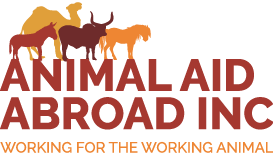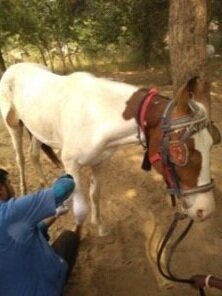Road Trauma for Working Animals
One of the most harrowing issues faced by working animals around the world is their involvement in traffic accidents. Many donkeys, horses, mules, ponies and camels are forced to work on very busy roads, where collisions with cars, motorbikes, trucks or tractors can injure them horrifically. Some working animals are also wounded after falling on roads due to overloaded carts or owners who push them into oncoming traffic. Aside from the initial pain and distress caused, owners frequently take their animals back to work too soon, before they have properly recovered from their injuries and memory of their trauma. This results in even further suffering and pain, for the animals are afraid to be injured again. Sadly, the response from owners is to whip them even harder.
One of our partner groups in India, Friendicoes, sent us a report recently highlighting examples of working animals who have been injured in road traffic accidents. In one case, a horse had an accident with a car whilst running along the side of the road, sustaining a deep, lacerated wound on his hock. This poor animal was in so much pain he was kicking whilst veterinary treatment was carried out. Friendicoes also treated another horse during November who had been involved in an accident with a tractor. This horse sustained a lacerated wound on her shoulder. In both cases, Friendicoes cleaned and dressed the wounds and administered antibiotics, pain killers and tetanus vaccines.
In two other sad examples, Friendicoes were called to treat horses who had fallen on roads whilst pulling heavy carts, resulting in knee wounds and lameness. In both instances, the horses’ wounds were cleaned with antiseptics and dressed, whilst pain killers and tetanus vaccines were also given. Additionally, one of the horses required antibiotics as the knee wound had become infected. In yet another case seen by Friendicoes, a pony had slipped on a road and sustained a similar knee injury. Falls such as these are usually caused by overloaded carts, owners who try to force their animals to run or who push them into oncoming traffic. Poor shoeing also adds stress to the animals’ joints and many equines are kept in extremely unhygienic places while they are not working, meaning injuries can take even longer to heal.
Unfortunately, Friendicoes have reported that many of these injured and traumatised animals will know no rest. They are being sent back to work far too soon and, if they resist due to ongoing pain from their injuries, they are simply whipped more intensely. Animal Aid Abroad hope to raise awareness of this terrible plight faced by working animals involved in traffic accidents in many countries. Thanks to our generous donors, we will continue supporting various organisations treating working animals injured on roads and educating owners on the importance of providing adequate rest and recovery time for their animals.










